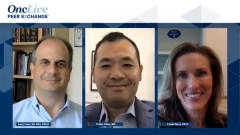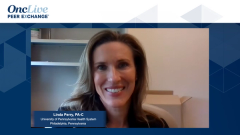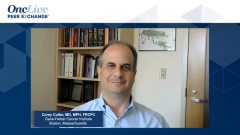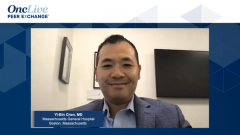
Identifying the Role of the Microbiome in HSCT and GVHD
Expert panelists review the role of the microbiome in the context of hematopoietic stem cell transplantation and steroid-refractory acute GVHD.
Episodes in this series

Transcript:
Corey Cutler, MD, MPH, FRCPC: Yi-Bin mentioned very briefly the use of fecal microbiota transplants. I think it’s worth discussing for a few minutes the role of the microbiome, be it the GI [gastrointestinal] microbiome or even the skin or pulmonary microbiome, in the initiation events of acute graft-vs-host disease [GVHD]. We think that there is a very important and very poorly understood interaction between our own innate immune system and the common cell organisms that live in our gut. We’re learning now how some of these organisms might actually be proinflammatory, [and] how dysbiosis or a change in our own microbiome might in fact promote the occurrence of acute graft-vs-host disease. The therapeutic of fecal microbiome transplant has been entertained and has been tested at MGH [Massachusetts General Hospital]. Why don’t you tell us a little about what you think about the role of that as a therapeutic in GI GVHD, Yi-Bin?
Yi-Bin Chen, MD: I think it’s based upon the belief that the microbiome somehow shapes our immune system. Corey, as you said, those interactions are truly poorly understood. And right now, most of the studies, in fact, all the studies are what we say associative at best, without showing a clear cause and effect. Trying to figure out interventions targeting the microbiome is certainly an interest of ours. The ways you can do it are with prebiotics, which are nutrients that support the diversity, or with probiotics, meaning you actually give the bacteria, such as in a fecal microbiome transplantation. Then the other way is a certain selective choice of antibiotics from an empiric perspective to help shape your microbiome.
It’s an exciting field in the sense that I think a lot of us feel there’s something there, but developing the right intervention and studying the right end point in the right trial has proven much more difficult than once thought. The adverse events that are associated with dysbiosis, which is the restricted microbiome, include things like C diff [Clostridioides difficile] infection, bacteremia, graft-vs-host disease, relapse, and so forth. It’s a bit all over the place in trying to figure out what the primary end point of a trial should be.
Then we have studied certainly third-party, so a donor, fecal microbiota transplantation. We have an active trial for high risk, meaning lower GI, newly diagnosed graft-vs-host disease, as well as steroid refractory. Others have studied this as well, including investigators in the US [United States] as well as internationally, and [have] shown impressive results. Though much of this undoubtedly is from publication bias of anecdotes that have worked. It’s tough to know without having a proprietary product and studying it in a formal clinical trial what the true effect is.
If we use third-party fecal microbiota transplantation, it’s hard to create that product itself because you’re using different donors, and they have different constituents of that actual product. Using a company with a designed product has advantages from that perspective, but maybe we’re lacking certain constituents that we don’t know about that may exist in very small amounts in a donor’s microbiome. It’s a hugely interesting field, and ongoing trials across the world are trying to help figure out if there is a microbiome-targeted intervention that can influence transplant outcomes.
Corey Cutler, MD, MPH, FRCPC: I think that’s one of the hottest topics in transplantation, and I think we’re going to learn a lot more about that in the next few years.
Transcript edited for clarity.








































